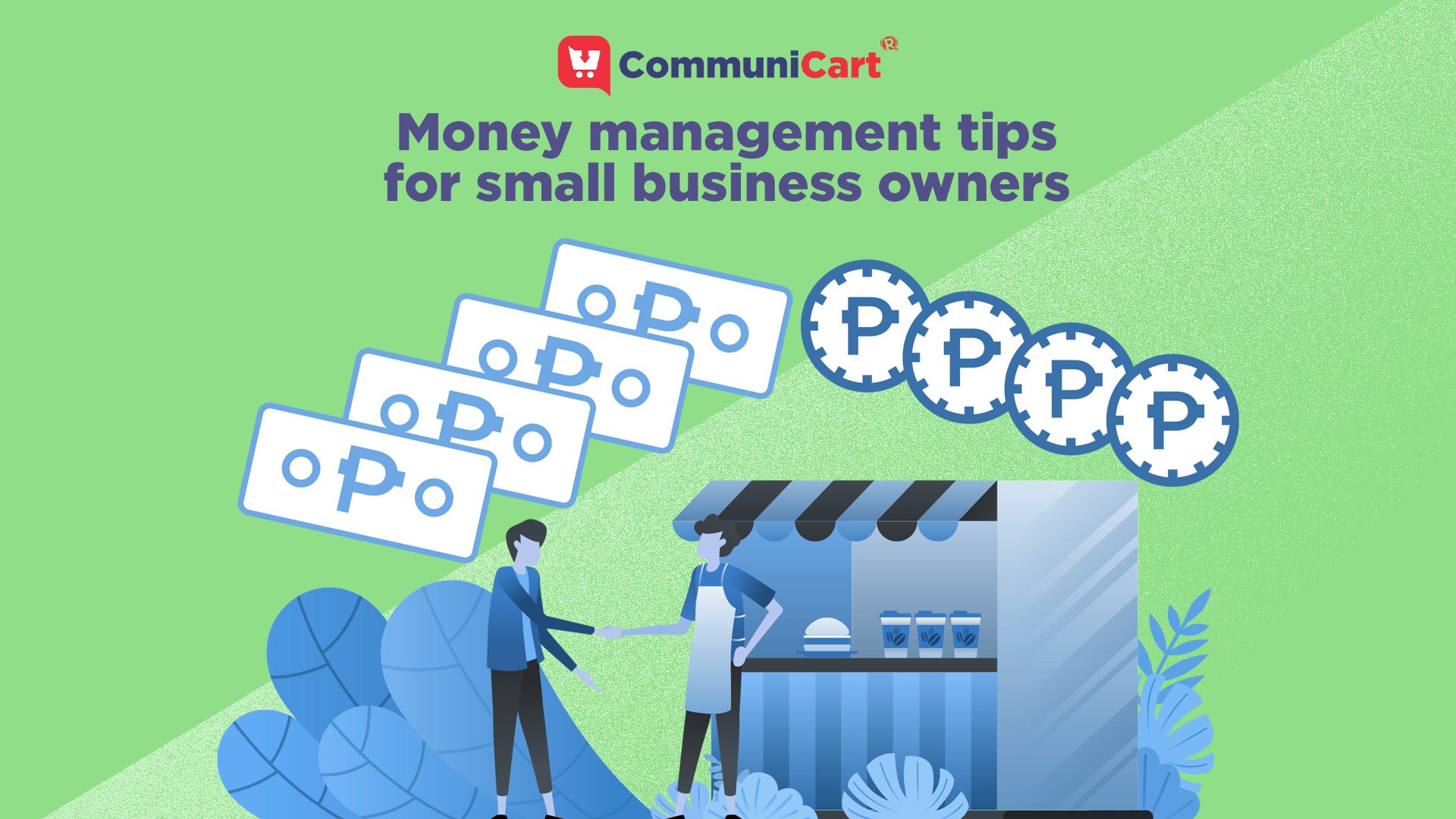SUMMARY
This is AI generated summarization, which may have errors. For context, always refer to the full article.

Editor’s note: CommuniCart features stories for and about MSMEs. It’s a space where small businesses can advertise at friendlier rates and also find helpful resources they can use to grow their brand. Work with us by emailing CommuniCart@rappler.com.
“When you’re a small business owner, you feel that everything the business earns is your money. That’s a dangerous thought.”
This was the first line that Salve Duplito told me when I asked her about how entrepreneurs are supposed to handle their money, and it got me dumbfounded. Isn’t the money that your business earns, well…yours?
Technically, yes it is, but it shouldn’t be.
Salve Duplito is a financial journalist and Registered Financial Planner®, most known for hosting the ABS-CBN News Channel show called On The Money where she would give personal finance advice to her watchers. She also has her own independent financial advisory company called Empower and Transform with the goal of making financial services more accessible and affordable.
In our conversation, she clarified that many entrepreneurs, especially those who are starting out, have a tendency to treat their profits as extensions of their wallets.
“That’s dangerous because when you fall short, you will cannibalize your business to the point that it will not have the resources to survive especially during turbulent times like the pandemic. Eh turbulent na nga during okay times, lalo na during the pandemic.”
This is commingling, and is the first piece of advice she shared as we mapped out key pieces of advice every small business owner should learn.
Here are more nuggets of knowledge from Salve Duplito that every small business owner should know:
The 20-20-60 approach
Commingling, as Duplito explains, is when you treat each earning your business makes as your own money. She says that this shouldn’t be the case because when the business goes down, you go down, and vice versa.
Her advice? Give yourself a salary. If you have a fixed salary, you stop relying too much on each sale that you make.
Your salary will be for personal needs like groceries, medicine, and clothing. This also gives you an opportunity to have personal investments as well as an emergency fund which we will explain more of later on.
There are many approaches to creating your own salary, but a suggestion from Duplito is following the 20-20-60 approach. This entails dividing the net income of your business into three buckets. The first 20% is for the owner’s salary (or dividends since dividends are taxed less compared to a salary). The other 20% is an extra bonus for employees so they have more incentive to stay and work hard.
“Then the 60%, what do you do with it? You make it grow by reinvesting it [back] in the company, in new products, or another company. So that the power of compounding works for you. If you do this, you’re not commingling your money and that of the business.”
Emergency fund
Everyone needs a security blanket to fall on, the pandemic has taught us that. In the past, most advisors would recommend having three to six, sometimes nine months’ worth of expenses for your personal emergency fund. This is so that you don’t worry about the short-term if you lose your job or business. Duplito says ideally, you would want to extend this further to last for at least a year.
She also believes that the same idea could be applied for businesses. Duplito shared that in one of her interviews with billionaires, one of them told her that they had asked their team how long they can survive with zero revenue.
“Three years daw. Magpapa-sweldo sila and everything, without revenues, they will survive. Ganun din, for small businesses that’s what you need to do. You ask yourself now — how long can you survive with zero revenues, and if you are commingling your finances with that of the business you will not be able to survive with zero revenues,” she said.
Having this much money set aside for emergencies is a lofty and expensive idea, but is one that Duplito swears by. She also says the same about insurance.
“Karamihan ng negosyante, ayaw ng life insurance, ayaw ng medical insurance because they feel that it’s a waste of money. They like making money, they like investing money. Even if it’s just slabs of wood, business owners would rather put money in slabs of wood that they can sell for a little higher after a couple of months than buy life or medical insurance. Yan ang thinking ng traditional Filipino na negosyante, but COVID has changed that.”
Her advice is to get the cheapest one with the highest coverage that you can afford. Just make sure to read the fine print carefully so you know what you’re getting yourself into.
Loans and credit lines
The hard truth when it comes to financing a business is that startups and small businesses face a lot of scrutiny when applying for a loan, not to mention having to produce substantial collateral just to talk to a banker.
This is a barrier that leads many business owners to rely on personal loans or credit cards, which Duplito respects but doesn’t encourage. “If a corporation has an unsustainable amount of debt, the business is in trouble, but the liability ends there. There’s more leeway if it’s a company that borrows money because the bank can’t take the personal assets of the owner. So yung sarili mong bahay hindi kukunin. Pag as a person you’re going to borrow, the bank can get your house.”
Another tip that Duplito gives is checking the effective interest rates for loans because they’re usually different from initial quotes or what is advertised publicly.
Work with financial advisors
If you’re looking for financial advice, the internet is a good place to start. But if you want actual advice based on your own unique circumstances, working with someone who has the right body of knowledge and experience can get you to where you need to be financially.
Duplito divides the kinds of financial advisors into different tiers. Her gold standard are those who are fee-based and independent, and don’t earn commissions from companies or products. There are many independent financial advisors that you can get in touch with, including ones from Duplito’s own Empower and Transform called Transformaric Coaches.
Banks also have trust departments where you can acquire the services of a financial advisor. There are also accountants with financial planning backgrounds. Then her fourth tier would be insurance agents that you can trust will give you the right service without forcing you to buy a product you don’t need.
If you want to explore more about money management, you can get your feet wet by checking out Salve Duplito’s tutorials and interviews on her YouTube channel, or checkout her Facebook page. – Rappler.com
Add a comment
How does this make you feel?





![[Good Business] Coalition of the willing](https://www.rappler.com/tachyon/2024/07/TL-Coalition-of-the-willing.jpg?resize=257%2C257&crop=423px%2C0px%2C1080px%2C1080px)

![[Good Business] Humanistic national development in the era of AI](https://www.rappler.com/tachyon/2024/06/tl-humanistic-development-of-AI.jpg?resize=257%2C257&crop=284px%2C0px%2C720px%2C720px)
![[Good Business] Redefining success, guided by values](https://www.rappler.com/tachyon/2024/06/TL-Philippines-business-La-Salle-june-12-2024.jpg?resize=257%2C257&crop=290px%2C0px%2C720px%2C720px)


![[Finterest] Private banking: How the wealthy keep the money within the family](https://www.rappler.com/tachyon/2024/07/Finterest-wealth-between-the-family.jpg?resize=257%2C257&crop=425px%2C0px%2C1080px%2C1080px)
![[Finterest] Credit card 101: How does it work, and which one is for you?](https://www.rappler.com/tachyon/2024/06/credit-card-stock-photo.jpg?resize=257%2C257&crop_strategy=attention)

![[Finterest] How deposit insurance keeps your money safe when a bank closes](https://www.rappler.com/tachyon/2022/09/shutterstock-philippine-peso.jpg?resize=257%2C257&crop=329px%2C0px%2C900px%2C900px)
There are no comments yet. Add your comment to start the conversation.